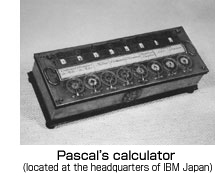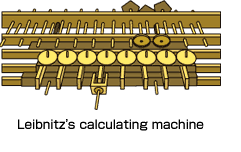|
|
 |
 |
| Society continued to develop, leading to greater international trade and taxes. People needed to do lots of difficult calculations in order to manage money deposits and withdrawals, make calendars, and so that ships could navigate the seas. Before long people started dreaming about a calculator that could do all these difficult calculations automatically. The quest for the automatic calculator had begun. |
 In 1642, the French mathematician Pascal invented the world’s first calculator. It was a mechanical calculator that was operated through the use of gears. But this calculator could only do addition, and Pascal himself was the only person who knew how to repair it. It was very expensive to make and only a few people doing certain jobs actually needed a calculator, so they never gained popularity. This did not discourage Pascal, and by the time he died at the age of 39, he had created 50 types of calculation machines. In 1642, the French mathematician Pascal invented the world’s first calculator. It was a mechanical calculator that was operated through the use of gears. But this calculator could only do addition, and Pascal himself was the only person who knew how to repair it. It was very expensive to make and only a few people doing certain jobs actually needed a calculator, so they never gained popularity. This did not discourage Pascal, and by the time he died at the age of 39, he had created 50 types of calculation machines. |
 Then in 1694, the German philosopher, Leibnitz invented a calculator that could do both addition and multiplication. It was based on Pascal’s calculator, but could be operated by using a crank handle that turned the gears inside the machine. Leibnitz’s calculating machine was the first hand-cranked calculator. This concept was used for more than three hundred years, up until the 20th century. Then in 1694, the German philosopher, Leibnitz invented a calculator that could do both addition and multiplication. It was based on Pascal’s calculator, but could be operated by using a crank handle that turned the gears inside the machine. Leibnitz’s calculating machine was the first hand-cranked calculator. This concept was used for more than three hundred years, up until the 20th century. |
 |
| In the 1800s, there was an English mathematician named Charles Babbage who liked to do astronomical calculations using very long numbers. So, he created a gear-operated mechanical calculator called the Difference Engine. He also invented the Analytical Engine which could do more advanced calculations. The Analytical Engine could perform three specific jobs. (1) It could remember calculation procedures (storage unit). (2) It could perform calculations (arithmetic unit). (3) It could print out the calculation results. Babbage died at age 80 without seeing the completed calculator. But the concept behind the Analytical Engine is the basis for today’s computer and his invention is widely respected today. |
|
 |
 |
|